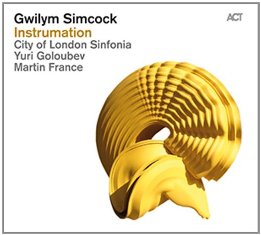
Impossible Gentlemen pianist Gwilym Simcock’s most recent album Reverie at Schloss Elmau released in January was a sumptuous duo affair on which Simcock was joined by double bassist Yuri Goloubev. The bassist is also featured here in both settings: ‘Move!’, the first, a five-part chamber-music suite with Goloubev and Simcock joined by Spin Marvel drummer Martin France, guitarist John Parricelli, and the 14-piece City of London Sinfonia conducted by Clark Rundell. ‘Simple Tales’, the second suite, is different: Simcock plus violin, cello, Goloubev again and France.
Recorded not in Germany, where Reverie was made, but in London’s Angel studio in November 2012 Instrumation is more about Simcock the composer in a standalone sense than before, although this has been an emerging factor for some time on a raft of projects. The arrangements for orchestra are subtle, and there’s an invisible sewing together of classical and jazz elements that only on ‘Industrial’ dedicated to the pianist’s father does the direction become more obviously rhythmic, Metheny-esque in scale but from a brassily different Simcockian acoustic jazz vantage point.
‘Simple Tales’ manages to harness Simcock’s Englishness in the Iain Ballamy balladic quasi folk-like sense allowing Thomas Gould’s pastoral violin part on ‘Overture’ for instance and a certain melancholia again courtesy of Gould on ‘Long Road’ (probably the most memorable melody on the album emerging after a beautiful piano introduction). The fascinating ‘Mr Bricolage’, inspired improbably by a French builder-merchant firm, a tune that resolves itself a little like Chick Corea’s ‘What Game Shall We Play Today’, with a few shouts and odd excursions thrown in for good measure, is a strong highlight.
If push were to come to shove I’d prefer the more jazz-obvious ‘Simple Tales’ part of the album. However, the design of Instrumation is such that if you listen to a lot of classical music then ‘Move!’ might have just as much appeal. Simcock does not attempt to fuse the two musics; more to put certain aspects of their commonality alongside one another, and in the process does not stifle the creativity of the players from either discipline, but rather lets their spirit fly. SG